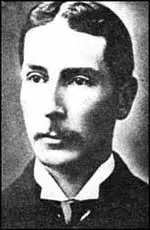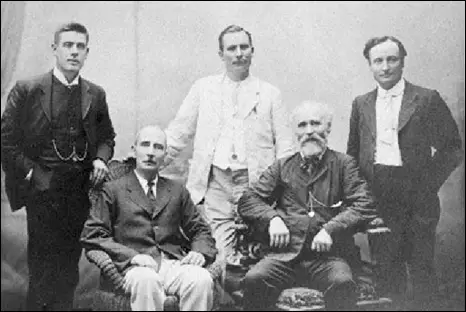Henry Hyde Champion

Henry Hyde Champion, the son of Major-General J. H. Champion, was born in India on 22nd January, 1859. He attended Marlborough College and after achieving a military commission in the Royal Artillery served with distinction in the Second Afghan War.
In 1881 he returned to England after becoming ill with typhoid. While recovering in PortsmouthHenry Champion read a great deal, including Progress and Poverty by Henry George, the Communist Manifesto by Karl Marx and Friedrich Engels and several books by John Stuart Mill. These books radicalized Champion and he began to question Britain's foreign policy. In 1882 Champion resigned from the British Army in protest at its Egyptian campaign.
Henry Champion now described himself as a Christian Socialist and in 1882 became editor of the journal, the Christian Socialist. He also joined the Social Democratic Federation (SDF) and showed his commitment by giving the party £2,000. H. H. Hyndman, the leader of the SDF, appointed Champion as editor of the organisation's newspaper, Justice.
In the 1885 General Election, Champion and Hyndman, without consulting their colleagues, accepted £340 from the Conservative Party to run parliamentary candidates in Hampstead and Kensington. The objective being to split the Liberal vote and therefore enabling the Conservative candidate to win. This strategy did not work and the two SDF's candidates only won 59 votes between them. The story leaked out and the political reputation of both men suffered from the idea that they were willing to accept "Tory Gold".
Tom Mann got to know Champion during this period: "Henry Hyde Champion was about my own age, an ex-artillery officer, a foremost member of the SDF, taking part in all forms of propagandist activity, showing keen sympathy with the unemployed. He had a fine, earnest face, and a serious manner in dealing with the sufferings of the workers. Champion, being a man of vigorous individuality, and genuinely devoted to the movement, could not always wait to get his views as to various forms of propagandist activity endorsed by a committee. He would act upon his own initiative, and commit the organization to plans and projects without consultation. Naturally this would give rise to strong expressions of opinion, frequently of an adverse character, arising from the natural human dislike to being pitch-forked into a project, however excellent, without having any reasonable opportunity for consideration."
In 1886 the Social Democratic Federation became involved in organizing strikes and demonstrations against low wages and unemployment. After one demonstration that led to a riot in London, Champion, H. M. Hyndman and John Burns, were arrested but at their subsequent trial they were all acquitted.
Champion, a Christian Socialist, objected to Hyndman's atheism. He was also concerned by Hyndman's support of violent revolution. Champion's criticisms of Hyndman resulted in him being expelled from the SDF in 1887. He joined the Fabian Society, and although he respected the ideas of George Bernard Shaw and Annie Besant, he was disappointing by their lack of interest in forming a working-class political party.
In 1888 Champion, John Burns and Tom Mann formed the Labour Elector. Edited by Champion, the paper campaigned for the eight-hour day, denounced bad employers and criticised trade union Liberal MPs in the House of Commons. The Labour Elector argued strongly for a new working-class party with strong links to the trade union movement.
As well as writing about industrial disputes, Champion also helped to organize them, and in 1888 joined with Annie Besant and her socialist journal, The Link, to help the Matchgirls Union defeat the Bryant & May company. The following year Champion emerged with Ben Tillett, Tom Mann and John Burns as one of the leaders of the London Dock Strike. Tillett later recalled: "Our principal Press Officer (during the 1889 Dock Strike) was the socialist journalist, Henry Hyde Champion, one of the founders of the Fabian Society. Although he was in no way officially connected with the strike, he rendered us very valuable help."
Champion had argued for a long time that the British working-class needed a political party that would provide an alternative to the Social Democratic Federation. He therefore fully supported the formation of the Independent Labour Party in 1894. However, trade unionists in the organisation were suspicious of Champion because of his privileged background.
At a conference in Manchester in February 1894, references were made to Champion's involvement with the Conservative Party in the 1884 General Election and delegates suggested that he was not to be trusted. The Times reflected the views of many members: "Champion was an exceedingly able writer and the wielder of a caustic pen. He had, however, the temperament of an aristocrat and an inborn sympathy with Conservative traditions, both of which prevented him from really understanding and sympathizing with the minds of the masses whom he endeavoured to lead."
Champion was so upset by the comments at the conference that he left the Independent Labour Party and emigrated to Australia. Champion settled in Melbourne where he married Elsie Belle Goldstein, the younger sister of the Australian suffragist Vida Goldstein.
Champion suffered a stroke in 1901 which left him semi-paralysed, with his speech affected and a limp, and unable ever again to use his right hand for typing. However, in 1906 he was able to establish the Australasian Authors' Agency, that published the work of aspiring Australian novelists.

Champion became friends with David Low during the First World War. He later recorded: "Who in 1915 would have identified the mild old gentleman, editor of a tiny literary monthly, walking tremulously with the aid of two sticks in the Melbourne sunshine, with the determined young ex-artillery officer H. H. Champion of the 1880s... No one, I wager. Illness, disappointment and age had long since withdrawn Champion from politics to books. But he retained an interest in justice and right."
Henry Hyde Champion died in South Yarra on 30th April 1928.
Primary Sources
(1) Tom Mann, Memoirs (1923)
Henry Hyde Champion was about my own age, an ex-artillery officer, a foremost member of the SDF, taking part in all forms of propagandist activity, showing keen sympathy with the unemployed. He had a fine, earnest face, and a serious manner in dealing with the sufferings of the workers. Champion, being a man of vigorous individuality, and genuinely devoted to the movement, could not always wait to get his views as to various forms of propagandist activity endorsed by a committee. He would act upon his own initiative, and commit the organization to plans and projects without consultation. Naturally this would give rise to strong expressions of opinion, frequently of an adverse character, arising from the natural human dislike to being pitch-forked into a project, however excellent, without having any reasonable opportunity for consideration.
(2) Ben Tillett, Memories and Reflections (1931)
Our principal Press Officer (during the 1889 Dock Strike) was the socialist journalist, Henry Hyde Champion, one of the founders of the Fabian Society. Although he was in no way officially connected with the strike, he rendered us very valuable help. In some ways Champion was a remarkable man. The son of a Major-General and himself had served as an artillery officer, after leaving university. But he had abandoned the military career for journalism, and attached himself to the Socialist Movement.
(3) Henry Hyde Champion's obituary in The Times (2nd May, 1928)
Champion was an exceedingly able writer and the wielder of a caustic pen. He had, however, the temperament of an aristocrat and an inborn sympathy with Conservative traditions, both of which prevented him from really understanding and sympathizing with the minds of the masses whom he endeavoured to lead.
(4) While working for the Sydney Bulletin in Australia, David Low got to know H. H. Champion.
Who in 1915 would have identified the mild old gentleman, editor of a tiny literary monthly, walking tremulously with the aid of two sticks in the Melbourne sunshine, with the determined young ex-artillery officer H. H. Champion of the 1880s, who introduced John Burns and Keir Hardie to political life, and who with Burns and Hyndman led a riotous mob of unemployed through London's clubland, leaving a trail of broken windows? No one, I wager. Illness, disappointment and age had long since withdrawn Champion from politics to books. But he retained an interest in justice and right. Whenever I did a cartoon which in content departed from the strictly sane view I was sure next day to run into Champion, advancing slowly down the street like a conscience. He would stop, look me in the eye, smile gently and say, "Not quite, David, do you think?" Very effective criticism, coming from that old war-horse.

